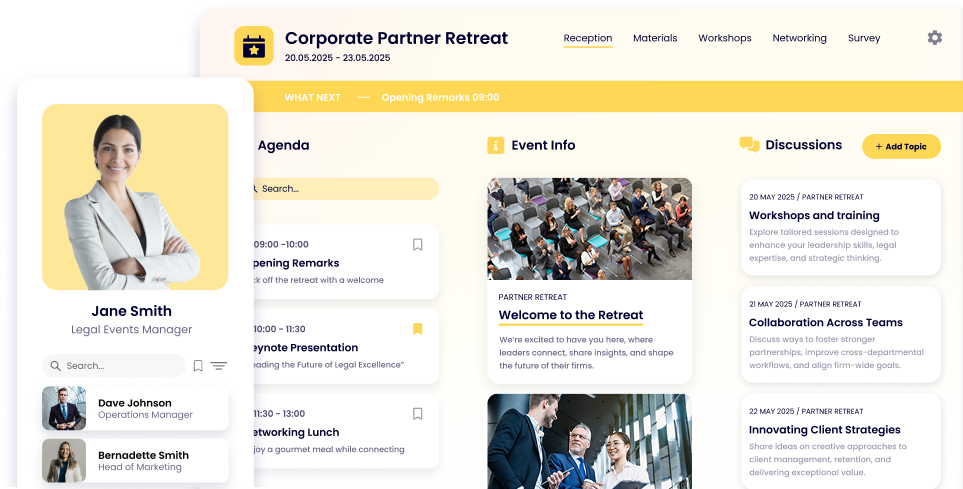Legal Intranet: Top Features and Best Software for Your Practice

Lisa Broom | Head of Marketing

Why should law firms prioritize an intranet? Today’s legal teams juggle more information, faster deadlines, and higher client expectations than ever before.
A law firm intranet changes the game by centralizing everything from case documents to team communication in one secure place.
Far from being a mere storage tool, an intranet becomes the foundation of an efficient, well-coordinated firm. With its ability to streamline communication, simplify collaboration, and secure critical information, a legal intranet empowers teams to operate at their best.
This article explores the features that make a law firm intranet indispensable. We’ll look at how the right intranet solution can transform daily operations, improve accessibility, and enhance task management—taking your firm’s productivity to the next level.
Key Takeaways
- A legal intranet consolidates essential functions like document management, collaboration, and secure messaging into one platform.
- With Fliplet’s intranet solutions, law firms can achieve greater team efficiency, security, and compliance.
- Integrating the right features in your first legal intranet supports a productive, organized, and engaged workforce.
Why Is It Important for Legal Firms to Have an Intranet?

Have you ever struggled to find a key document or track down a colleague for input? An efficient intranet for legal professionals solves these pain points by creating a centralized space that streamlines daily tasks and improves firm-wide communication.
With capabilities like secure document sharing, intuitive collaboration tools, and real-time updates, an intranet supports smoother workflows and enhances client service. Combine this with Fliplet—which allows you to build legal apps quickly and efficiently (and without needing to use any code)—and you’ll have a full-spectrum legal tech approach.
Legal intranets specifically address intranet legal issues like data confidentiality, compliance, and restricted access. Fliplet’s legal intranet solutions have been designed with these needs in mind, ensuring your firm can collaborate freely while maintaining security and privacy.
Why Do Law Firms Choose Fliplet?
Fliplet’s first legal intranet is tailored to the unique needs of legal professionals. Fliplet prioritizes accessibility, user experience, security, and collaboration, offering a streamlined platform that any firm can adapt to fit its specific workflow. Here’s how Fliplet stands out:
- Accessibility & Mobility: Accessible on various devices, Fliplet’s intranet supports remote work and quick updates from any location.
- Enhanced User Experience: An intuitive interface allows for easy navigation, encouraging adoption across the firm.
- Better Collaboration & Communication: With tools for secure messaging, document sharing, and collaborative editing, Fliplet improves team synergy.
- Security & Compliance: Protecting client data is critical in legal settings. Fliplet includes built-in compliance features to safeguard sensitive information.

FLIPLET CASE STUDY-
“Building Apps using Fliplet is not only simple but it is also very cost-effective. The Fliplet studio makes it easy for someone with no coding experience to design fully functional apps ready to deploy in just hours.”
Top Legal Intranet Software Solutions for Law Firms
Selecting the right legal intranet software is essential for law firms looking to optimize workflow, enhance collaboration, and maintain secure access to information.
An effective intranet combines document management with tools that support legal operations, enabling secure communication, smooth workflows, and easy access to essential data. Check out Fliplet’s solutions for lawyers to see all the ways these features can be combined to create a fully custom tool for your practice.
Here’s a closer look at the must-have features that top legal intranet solutions provide and how they can elevate your firm’s productivity.
1. Knowledge Management
Knowledge management is the foundation of any intranet system designed for law firms. The best legal intranet solutions offer centralized access to a vast repository of information, such as legal precedents, case studies, and ongoing research materials.
This feature ensures that team members can quickly locate important resources and reference materials, reducing time spent searching through scattered files. Additionally, shared knowledge repositories encourage collaboration, enabling teams to add new insights or case updates in real-time. This setup fosters an environment of continuous learning and improvement, benefiting both individual attorneys and the firm as a whole.
For example, Fliplet’s management tools allow for organized information sharing, creating a space where team members can easily access, edit, and contribute to ongoing legal research and case data.
2. Online Forms
Handling client information and case intake efficiently is critical in legal practice. Intranet systems equipped with customizable online forms can streamline data entry and make case intake faster and more organized.
These forms can be customized to collect essential data, which reduces errors and ensures that all relevant client information is captured accurately. Instead of relying on paper forms or scattered digital documents, legal teams benefit from a single, accessible format where all case intake information is securely stored.
With Fliplet’s online form capabilities, law firms can create forms that cater to specific case types or departments, improving the speed and organization of data handling and minimizing the risk of information loss.
3. Staff Directory
A staff directory feature is vital for larger firms where locating team members quickly is crucial. An up-to-date staff directory includes contact information, job roles, and department details, making it easier for attorneys and support staff to connect.
This feature can also facilitate better cross-department collaboration, allowing team members to reach out to colleagues with specific expertise or roles efficiently.
For example, Fliplet’s staff directory makes connecting with colleagues easy, fostering interdepartmental communication and providing quick access to essential contact details.
4. Legal Intranet’s Contact Directory
While the staff directory focuses on internal contacts, a legal intranet contact directory includes external contacts, such as clients, vendors, and other professional connections.
Having these contacts stored in one place simplifies communication with external parties, saving time and minimizing the chances of losing essential contact information. For law firms, managing these connections is essential, particularly when working with multiple clients, vendors, and other stakeholders.
An organized contact directory also makes onboarding new employees easier by providing immediate access to frequently used contacts.
5. Opportunities for Collaboration
Collaboration is at the heart of any productive legal team. Opportunities for collaboration are critical in intranet software, offering tools that allow teams to share resources and exchange ideas instantly.
Many legal intranets support collaborative editing and project workspaces, which make it simple for team members to work together on cases, brainstorm solutions, and share updates in real time.
Fliplet, for instance, provides collaborative tools where legal teams can co-author documents, leave comments, and provide feedback, creating a dynamic environment of open communication.
6. Client Portal
A client portal is a secure, dedicated space where clients can access their case information, communicate with the legal team, and submit documents, making interactions more transparent and accessible.
For clients, this feature provides a convenient, accessible way to stay informed, review documents, and track case progress, ultimately enhancing their experience and satisfaction. For the firm, it reduces the need for constant status updates, allowing attorneys to focus on case strategy rather than administrative tasks.
With Fliplet’s client portal, law firms can provide clients with real-time access to case updates and documentation, which strengthens client relationships and increases transparency.
7. Firm News and Corporate Calendar
Keeping everyone on the same page is crucial in a busy legal environment. An intranet news section and corporate calendar allow team members to stay informed about firm-wide updates, important events, and critical deadlines.
This feature is particularly helpful for scheduling and planning, as it highlights key meetings, client deadlines, and upcoming events, all accessible from one central location.
Fliplet’s news and calendar features allow firms to post announcements and create shared event reminders, ensuring that team members are aware of crucial dates and developments.
8. Simple and Intuitive Intranet Software
Adoption and ease of use are essential for an intranet’s success. A simple and intuitive interface makes it more likely that team members will use the intranet consistently. This ease of use reduces training requirements and allows employees to engage with the system immediately, focusing on their tasks rather than navigating complex software.
By prioritizing usability, Fliplet’s intranet solution helps firms integrate the platform seamlessly, allowing staff to benefit from its features without an extensive learning curve.
9. Security
Legal professionals handle sensitive data daily, making security a top priority for any intranet system. The best legal intranet solutions employ strong encryption, restricted access, and compliance measures to protect client information and uphold confidentiality standards. Security features are especially crucial when dealing with intranet legal issues, where data breaches could result in serious consequences.
Fliplet’s intranet solution includes robust security measures to protect sensitive information, from secure document sharing to restricted access controls, ensuring data remains confidential.
10. Employee Feedback and Recognition
An intranet should be more than just a tool for information—it can also help improve firm culture. Features like employee feedback and employee recognition foster engagement by giving staff a voice and recognizing their achievements.
Regularly collecting employee feedback helps firms refine their intranet experience, while recognition programs boost morale, motivating employees and fostering a supportive work environment.
Fliplet’s feedback and recognition tools allow firms to gauge employee satisfaction, enhance engagement, and celebrate team successes, reinforcing a positive workplace culture.
How a Law Firm Intranet Can Help You
A law firm intranet brings everything you need for efficient work into one accessible, secure location. Gone are the days of scrambling to find case files, track down colleagues, or search for policy updates.
With the right intranet solution, every resource is just a click away, allowing you to streamline tasks and stay focused on what matters most. Here’s how an intranet can transform your day-to-day work:
- Keeps Content Current: Access the latest policies, case documents, and client details instantly. When updates are centralized, everyone works from the most recent information, reducing errors and eliminating time lost on outdated materials.
- Fosters Team Engagement: Intranet platforms provide spaces for team collaboration, allowing for discussions, document sharing, and quick feedback loops. This interactive environment fosters stronger connections, making teamwork feel seamless—even in hybrid or remote settings.
- Enhances Job Efficiency: Quick access to communication tools and essential documents means you’re spending less time on administrative tasks and more on client-focused work. A well-designed intranet keeps everything organized, so you can jump between tasks without losing momentum.
With Fliplet’s intranet solutions for law firms, your team gains these advantages, plus the added benefits of security and customization tailored to the legal industry. Fliplet supports legal professionals in staying organized, productive, and engaged—whether you’re working remotely or from the office.
Important Features to Look For in Legal Intranet Software

When choosing intranet software, it’s essential to consider which features will have the biggest impact on your team’s efficiency and your firm’s security. Here are some criteria to keep in mind:
- Secure Linking: Choose a system that supports secure document linking to protect client data.
- Page-Specific Access: Enable page-specific access permissions so only authorized personnel can view sensitive content.
- Multi-Browser Compatibility: Opt for intranet software that works smoothly across various browsers to support different devices and user preferences.
- Ease of Use: A user-friendly platform promotes consistent use and reduces training time.
- Integration Options: Ensure compatibility with Active Directory or other relevant integrations for seamless access.

Ready to explore solutions tailored for the legal industry? Learn about our intranet solutions for law firms in our upcoming article.
Choosing the right law firm intranet transforms daily operations, from improved collaboration to enhanced document security. Whether your team needs better access to information, streamlined communication, or top-tier compliance features, a tailored intranet solution like Fliplet can provide everything in one user-friendly platform.
Embrace these features, and empower your firm to work smarter, securely, and more effectively. Ready to elevate your legal practice?
Explore Fliplet’s intranet solutions today.
FAQs
What features make a first legal intranet essential for law firms?
A first legal intranet is essential for centralizing documents, supporting secure messaging, and enabling collaboration, all of which enhance productivity and organization.
How does an efficient intranet for legal professionals improve productivity?
By providing quick access to documents, supporting streamlined intranet legal workflows, and enabling secure communication, an intranet reduces time spent on administrative tasks.
How does an intranet address legal issues in data protection and compliance?
Legal intranets include strong security measures like encryption and restricted access, which comply with data protection standards and keep client information confidential.
How does an intranet support legal workflows and task management?
Intranet features like task tracking, shared calendars, and document management support efficient legal workflows, making it easier for teams to stay organized and meet deadlines.
What are key considerations for intranet legal issues in confidentiality?
An intranet should prioritize secure access, encryption, and permission-based viewing to address confidentiality requirements and protect client data.





